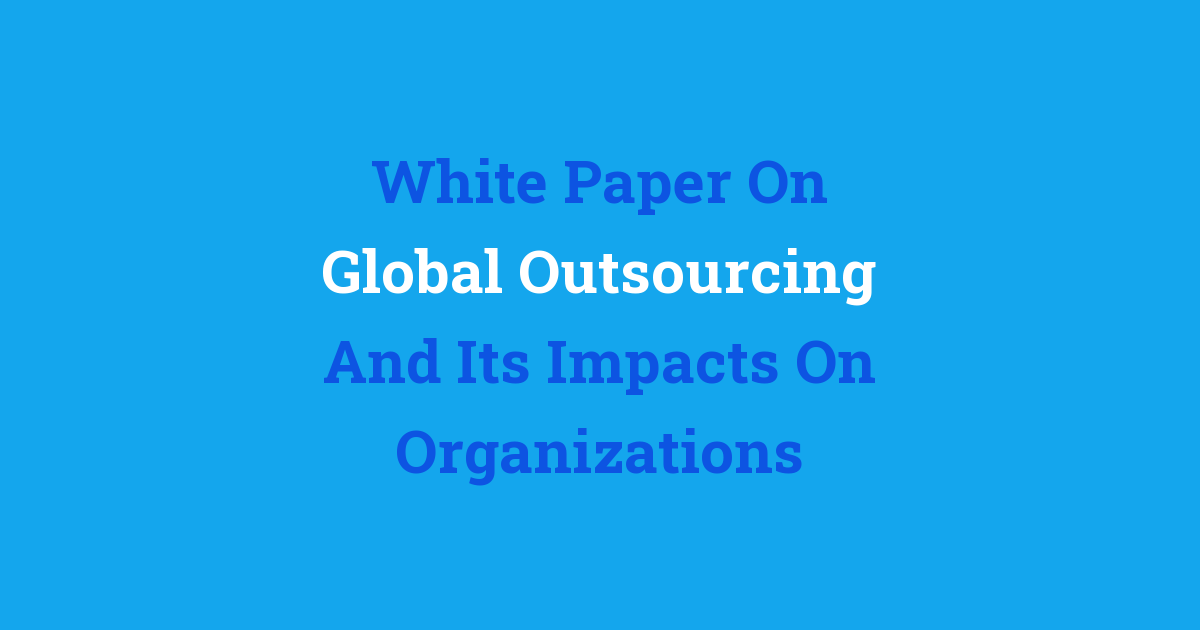Exploring the implications of global outsourcing on businesses in a comprehensive white paper.
White Paper on Global Outsourcing and Its Impacts on Organizations
Introduction
Outsourcing has become a popular business strategy for organizations looking to reduce costs, improve efficiency, and focus on their core competencies. Global outsourcing, in particular, involves contracting with external service providers in other countries to perform various business functions. While this practice offers several benefits, it also presents challenges and risks that organizations must carefully consider.
Problem Statement
The increasing trend of global outsourcing has raised concerns about its impact on organizations. One of the main issues is the potential loss of control over business processes and intellectual property. Additionally, outsourcing can result in communication barriers, cultural differences, and data security risks. Therefore, it is crucial for organizations to evaluate the risks and benefits of outsourcing before making decisions that could significantly impact their operations.
Existing System
In the existing system, organizations often outsource non-core functions such as customer support, IT services, and manufacturing to reduce costs and improve efficiency. While this approach can be beneficial, it also comes with challenges such as quality control issues, long lead times, and limited flexibility. Furthermore, outsourcing to offshore locations can lead to cultural differences and language barriers that may affect business performance.
Disadvantages
Global outsourcing poses several disadvantages for organizations, including:
1. Loss of Control: Organizations may struggle to maintain control over outsourced processes, resulting in quality issues and delays.
2. Communication Barriers: Language differences and time zone variations can hinder effective communication between organizations and service providers.
3. Cultural Differences: Varied cultural norms and values can lead to misunderstandings and conflicts that impact business relationships.
4. Data Security Risks: Outsourcing exposes organizations to data security threats such as hacking, data breaches, and intellectual property theft.
5. Dependency on Service Providers: Organizations may become overly reliant on external service providers, making it challenging to bring operations back in-house if needed.
Proposed System
To address the challenges associated with global outsourcing, we propose a new system that focuses on enhancing collaboration, communication, and data security between organizations and service providers. This system will leverage advanced technologies such as artificial intelligence, blockchain, and cloud computing to streamline processes, improve transparency, and mitigate risks.
Advantages
The proposed system offers several advantages for organizations engaging in global outsourcing, including:
1. Enhanced Communication: Advanced communication tools will facilitate real-time collaboration and information sharing between organizations and service providers.
2. Improved Data Security: Blockchain technology will ensure secure data transactions and protect sensitive information from cyber threats.
3. Quality Assurance: Artificial intelligence algorithms will monitor and analyze outsourced processes to maintain quality standards and minimize errors.
4. Cost Savings: Cloud computing services will enable organizations to scale resources based on demand, reducing operational costs and improving efficiency.
5. Flexibility: The new system will provide flexibility for organizations to adjust outsourcing arrangements as needed, allowing for greater agility and responsiveness.
Features
The proposed system will include the following key features:
1. Advanced Communication Tools: Collaboration platforms, video conferencing, and messaging apps to facilitate seamless communication.
2. Blockchain Technology: Decentralized ledger for secure data storage, authentication, and traceability.
3. Artificial Intelligence: Machine learning algorithms for process optimization, quality control, and predictive analytics.
4. Cloud Computing Services: Scalable infrastructure, storage, and computing resources for efficient operations.
5. Data Encryption: Encryption protocols and security measures to protect sensitive information from unauthorized access.
Conclusion
In conclusion, global outsourcing has both benefits and drawbacks for organizations, and it is essential to carefully evaluate the risks and rewards before engaging in outsourcing practices. The proposed system aims to address the challenges associated with outsourcing by enhancing communication, collaboration, and data security through advanced technologies. By implementing this system, organizations can optimize their outsourcing strategies, reduce risks, and improve operational efficiency in an increasingly globalized business environment.

